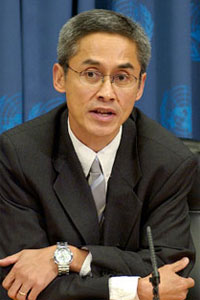
This year is a time to remember and reiterate two key instruments which have shaped responses to human rights implementation since the end of World War II in 1945. It was the task of the Universal Declaration of Human Rights (UDHR), based on a Resolution of the UN General Assembly adopted in 1948, to identify and list a number of key rights of a global nature.
This was the beginning of normative cartography locating civil, political, economic, social and cultural rights, such as freedom of expression and social security, in the concept of non-discrimination of universal import. These were the basic minimum benchmarks to which all countries should aspire. The part on "rights and freedoms" found in subsequent Thai constitutions is derived from the UDHR, and this year the latter will be 75 years old, still waiting for fulfilment at the national level.
The late 1940s till the early 1990s were a time of gestation. The first international human rights treaty of a binding nature, vested with a monitoring body, was the Convention for the Elimination of all Forms of Racial Discrimination. This was followed by others, now numbering nine key human rights treaties. All Asia-Pacific countries are parties to the Convention on the Rights of the Child, with a large number also as members of the Convention on the Elimination of All Forms of Discrimination against Women as well as the Convention on the Rights of Persons with Disabilities.
This was also a time of the Cold War between capitalist and socialist countries (at times dichotomised as West versus East), with the former highlighting civil and political rights contrasting with the latter's emphasis on economic, social and cultural rights, leading to the split of the potential main human rights treaty into two Covenants: International Covenant on Civil and Political Rights and International Covenant on Economic, Social and Cultural Rights.
Parallel to that, the decolonisation process was taking place, leading to the birth of new nation-states. This would also lead to new voices desiring a more inclusive approach in the post-War system, exemplified by the propensity to advocate a new generation of rights, such as the public right to participate in the development.
The beginnings of UN institutions on human rights, such as UN Special Procedures in the form of UN working groups and Special Rapporteurs to monitor human rights situations, were also noticeable. However, the pinnacle of the UN system, the UN Security Council, would often be blocked by the veto exercised by one or more of its five permanent members for political reasons, which also are interrelated with serious human rights concerns.
Intriguingly, increasing claims of particularities emerged in the early 1990s, especially from some non-democratic Asian countries claiming that there were some regional and national specifics which deserved to be highlighted more than some international human rights standards. This was the claim of "Asian values", such as the priority of family and collectivity over individuals, the prevalence of economic rights, such as the right to food, over political rights, such as freedom of expression.
The early 1990s were also preceded by the end of the Cold War in 1989 with the fall of the Berlin Wall. This period was marked by another instrument deserving emphasis on its 30th anniversary in 2023. The world conference on human rights took place in 1993. It adopted a global Declaration and Programme of Action ("The Vienna Declaration and Programme of Action"), opening doors to various developments below.
A heated debate was raging then between the universality and indivisibility of human rights versus regional and national particularities. The governmental human rights Declaration from the Asia-Pacific region in 1993, adopted in Bangkok, subjected universal standards to regional particularities, while the non-governmental organisations' "NGO Declaration", also adopted in Bangkok, emphasised human rights universality and indivisibility as primordial. The NGO message was that "one set of rights cannot be used to bargain for another (set of rights)", meaning that economic rights cannot prevail over political rights and that the former cannot be used to bargain for the latter, as they are all part of indivisible, universal rights. The compromise in Vienna was to state that while regional and national particularities are to be borne in mind, it is the duty of states to respect fundamental rights and freedoms, implying prevalence of universal/indivisible human rights over particularities.
A key consequence of the Vienna Programme was to advocate globally that "women's rights are human rights". This was to lead to much more attention on violence against women. Other groups deserving emphasis such as children, indigenous peoples, persons with disabilities, minorities, and workers, came to the fore more prominently. On a related front, institutional development has been key since 1993. The post of UN High Commissioner for Human Rights came into existence. The UN Centre for Human Rights became the Office of the UN High Commissioner for Human Rights with a more outward-looking role to service countries at the field level beyond Geneva.
The call for regional and national human rights institutions to promote and protect human rights was responded to by the setting up of several national commissions in the Asia-Pacific region, such as the National Human Rights Commission of Thailand. The seeds for the establishment of a Commission of the Association of Southeast Asian Nations (Asean) were sown during this time with various proposals and discussions on a mechanism for the Asean region. However, then and even now, protection of human rights to shield people from violence and discrimination remains a pivotal concern, aggravated by intermittent wars and seeping authoritarianism in Asia and the Pacific. Environmental degradation would also ravage the world community, thus gaining more attention to connect people's prosperity, profit and planet -- the existential triple bottom line.
